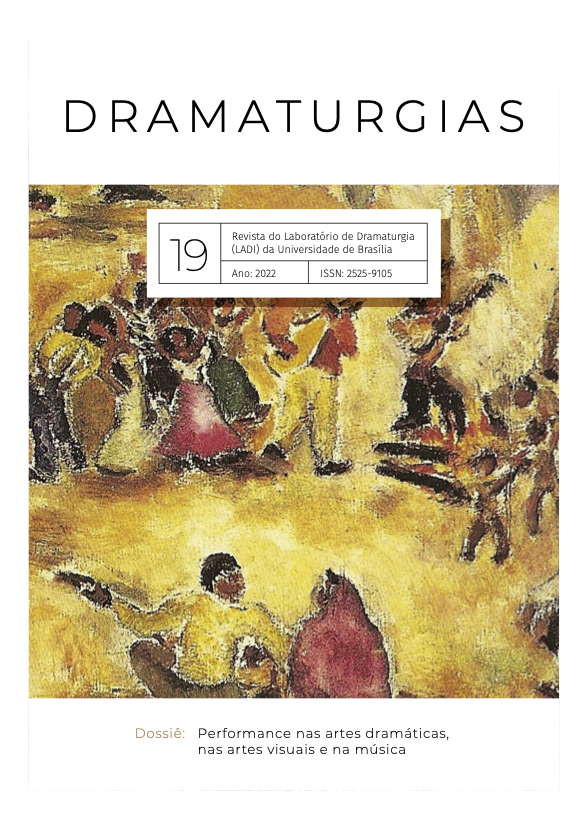Singing Homer’s Spell. The Disyllabic Contonation and the Proposition Made by East Roman Manuscripts
DOI :
https://doi.org/10.26512/dramaturgias19.45122Mots-clés :
Prosódia, Hexâmetro, Texto, Performance, HomeroRésumé
Neste ensaio, propõe-se a reconstituição do perfil melódico do verso homérico, de forma a se possibilitar a compreensão e reperformance de textos como Ilíada e Odisseia.
Téléchargements
Références
ADKINS, A. W. H., Poetic Craft in the Early Greek Elegists. Chicago: University of Chicago Press, 1985.
ALLEN, W. SIDNEY, Vox Graeca, 3rd edn. Cambridge: Cambridge University Press, 1987.
BARKER, ANDREW, Greek Musical Writings, ii: Harmonic and Acoustic Theory. Cambridge: Cambridge University Press, 1989.
DAITZ, STEPHEN G., ’On Reading Homer Aloud: To Pause or Not to Pause’, American Journal of Philology, 112:2 (1991), 149-60.
DAVID, A. P., The Dance of the Muses: Choral Theory and Ancient Greek Poetics. Oxford: Oxford University Press, 2006.
_____ ‘Seven Fatal Flaws in the Derivation of the Dactylic Hexameter from Aeolic Cola’, Classica: Revista Brasileira de Estudos Clássicos 25:1,2 (2012), 101-24.
_____ ‘The Classical Interlude: A Law of Recessive Tonal Accent for “Classical”- Era Indo-European’, Dramaturgias: Revista do Laboratório de Dramaturgia, 4:2 (2017), 229-37.
_____ ‘Demise of the Polar Bear’, Chronology and Catastrophism Review, 2019:2, 36-45.
KOENIG, AMY, ‘Homeric Accentuation: A Comparative Study of the Bankes Papyrus and Other Roman Papyri’. FirstDrafts@Classics, Center for Hellenic Studies, 2011.
KRETLER, KATHERINE, One Man Show: Poetics and Presence in the Iliad and Odyssey. Washington DC: Center for Hellenic Studies, 2020.
LORD, ALBERT P., The Singer of Tales. Cambridge: Harvard University Press, 1960.
MEILLET, ANTOINE, Les Origines indo-européennes des mètres grecs. Paris, 1923.
MOORE-BLUNT, JENNIFER, ‘Problems of Accentuation in Greek Papyri’, Quaderni Urbinati Di Cultura Classica, no. 29 (1978), 137–63.
NAGY, GREGORY, Review of M. L. West, Homeri Ilias, Vol 1. Rhapsodias I-XII continens, vol. 2. Rhapsodias XIII-XXIV et indicem nominem continens, Bryn Mawr Classical Review, 2000:09.12
_____ ‘Traces of an ancient system of reading Homeric verse in the Venetus A’, in Casey Dué (ed.), Recapturing a Homeric Legacy. Cambridge MA: Center for Hellenic Studies, 2009.
PAGANI, LARA, ‘Pioneers of Grammar. Hellenistic Scholarship and the Study of Language’, in Franco Montanari and Lara Pagani, eds., From Scholars to Scholia, Chapters in the History of Ancient Greek Scholarship. Berlin: De Gruyter, 2011.
_____ ‘The Iliad “Textscholien” in the Venetus A’, in Marco Ercoles, Lara Pagani, Filippomaria Pontani and Giuseppe Ucciardello, eds., Approaches to Greek Poetry. Berlin: De Gruyter, 2018.
REECE, STEVE, ‘Some Homeric Etymologies in the Light of Oral-Formulaic Theory’, The Classical World 93:2 (1999), 189-90.
WEST, M. L., ‘The Singing of Homer and the Modes of Early Greek Music’, The Journal of Hellenic Studies, 101 (1981): 113-29.
_____ ‘The Singing of Hexameters: Evidence from Epidaurus’, Zeitschrift für Papyrologie und Epigraphik, 63 (1986), 39-46.
_____ ‘The Textual Criticism and Editing of Homer’, in Glenn W. Most, ed., Editing Texts/Texte edieren. Aporemata II. Gottingen: Vandenhoeck & Ruprecht, 1998, 94-109. WYATT, WILLIAM F, ‘Homeric Loss of /w/ and Vowels in Contact’, Glotta 72:1/4 (1994), 119-50.
Téléchargements
Publié-e
Comment citer
Numéro
Rubrique
Licence

Cette œuvre est protégée sous licence Creative Commons Attribution - Partage dans les Mêmes Conditions 4.0 International.
Autores mantém os direitos autorais e concedem à revista o direito de primeira publicação, com o trabalho simultaneamente licenciado sob a Licença Creative Commons Attribution que permite o compartilhamento do trabalho com reconhecimento da autoria e publicação inicial nesta revista.



